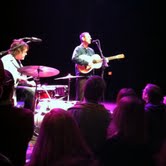 Jonathan Richman shows are kind of wistful serenades, instructional advisories, mini-Flamenco workouts with spontaneous dance breaks and eventually, welcoming multilingual pleas to join in the party.
Jonathan Richman shows are kind of wistful serenades, instructional advisories, mini-Flamenco workouts with spontaneous dance breaks and eventually, welcoming multilingual pleas to join in the party.
In fact, Richman may be better suited to a street corner, or busking in Montpamasse than the vast stage of a rock club as he was at the 9:30 Club in D.C. Friday.
He’s wholly portable — his one acoustic guitar is unplugged and amplified only by his microphone. His efficient drummer Tommy Larkin, who never uses anything heavier than brushes, sits at a set he could gather up with both hands.
This kind of do it yourself simplicity made him an influential figure in independent rock going back to the 70s, yet Richman at 61 has largely abandoned all of the material of his Modern Lovers and early albums, save for one key song, “Old World,” which he heavily reworked, in part to explain that he wasn’t interested in the 1940s — or 2003 for that matter.
He’s more at home explaining the ephemeral qualities of a woman’s charm — he began the set as if in mid conversation, “Because her Beauty is Raw and Wild” and continued later with “Her Mystery Not of High Heels and Eye Shadow.”
He was eager to discuss, in musical terms, art and the art of looking in “No One is Like Vermeer” and seemingly counterintuitive romantic advice of “Let Her Go into the Darkness.”
A couple of his reveries were autobiographical, about how as a suburban kid from Natick he fell in love with the smells of the city as a toddler in “The World is Showing its Face Hand” or how he found artistic epiphany as a teen in Harvard Yard in “Bohemia,” a singalong that helped bring an abrupt end to what was a surprisingly short one hour set.
For all his reliance on decade old material, he came up with one half-finished ditty about parents who talk on the cell phone while pushing their strollers, ignoring their babies. And he closed with an unrecorded song about wishing how he would have been softer when he was having a fight.
Like a cheerful activities director, he encouraged exercise and body movement in “Stultifying,” “These Bodies that Came to Cavort” and especially “I Was Dancing in a Lesbian Bar,” the theme song for a Friday night. In these he gently put down his guitar and did his own free movements in his flannel shirt, sweat pants and what looked to be hotel slippers, sometimes he’d add to Larkin’s solo percussion break with a tree of jingle bells or, in “Lesbian Bar,” a cowbell.
With a timeless boyishness and a disarming humor in his delivery he had the crowd rapt, allowing him to step away from the microphone and fill the room only with his guitar or naked voice if he wanted to.
At one point while attempting to demonstrate why he loved the club so much for precisely this kind of silence, somebody started bellowing their love and somebody else started to shush, and immediately Richman withdrew, saying he didn’t want to cause any conflicts in the crowd.
He also seemed to cut short his show as well — not really returning for a full encore, while recent set lists have shown he’s returned for 10 songs or more (including new things I wanted to hear like “Keith Richards”).
But Jonathan’s shows are like the moods in his songs: a fleeting, changeable thing, and we’ll just have to wish for more when he comes back.
The set list doesn’t do justice to all the Flamenco style guitar work that not only served as solos but connected so many of the songs:
- “Because Her Beauty is Raw and Wild”
- “No One Was Like Vermeer”
- “Let Her Go into the Darkness”
- “The World is Showing Its Hand”
- “Old World”
- “I Was Dancing in the Lesbian Bar”
- “Egyptian Reggae”
- “Her Mystery Not of High Heels and Eye Lashes”
- “Parents Pushing the Stroller While Talking on the Cell Phone”
- “Le Printeps Des Amoreux Est Venue”
- “Stultify”
- “These Bodies That Came to Cavort”
- “La Festa Magnifica”
- “La Fiesta Es Para Todos”
- “Everybody Come to the Party” (Hebrew)
- “Bohemia”
- “We Had a Fight”